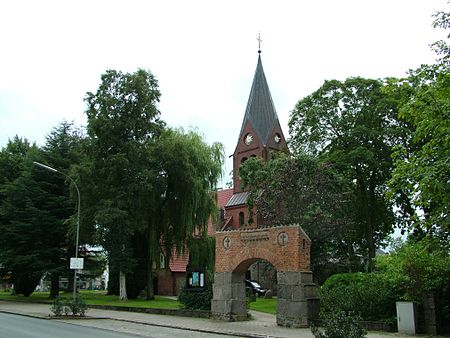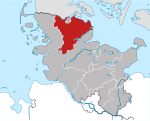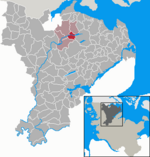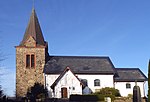Anglia (German and Low German: Angeln; Danish and South Jutlandic: Angel; Old English: Engel) is a small peninsula in northern Germany, on the Baltic coast of Jutland. Jutland consists of the mainland of Denmark and the northernmost German state of Schleswig-Holstein. Anglia belongs to the region of Southern Schleswig, which constitutes the northern part of Schleswig-Holstein. The region is often referred to in German as Landschaft Angeln (Landscape Anglia) or Halbinsel Angeln (Anglia Peninsula).
To the south, Anglia is separated from the neighbouring peninsula of Swania (Ger. Schwansen, Dan. Svans or Svansø) by the Sly Firth (Ger. Schlei, Dan. Sli), and to the north from the Danish peninsula of Sundeved (Ger. Sundewitt) and the Danish island of Als (Ger. Alsen) by the Flensburg Firth (Ger. Flensburger Förde, Dan. Flensborg Fjord). The landscape is hilly, dotted with numerous lakes. Whether ancient Anglia conformed to the borders of the Anglian Peninsula is uncertain. It may have been somewhat larger; however, the ancient sources mainly concur that it also included the peninsula's territory.
Anglia has a significance far beyond its current small area and country terrain, in that it is believed to have been the original home of the Angles, Germanic settlers in East Anglia, Central and Northern England, and the Eastern Scottish Lowlands. Their migration led to their new homeland being named after them, from which the name "England" derives. England, East, Mid and West Anglia as well as the English language, thus, ultimately derive at least their names from Anglia.
Anglia is the location of two historically important castles. Glücksburg Castle in Glücksburg is the seat of the House of Schleswig-Holstein-Sonderburg-Glücksburg, which is the royal house of Norway (since 1905), and the official royal house of Denmark (since 1863; patrilineal 1863–2024). It was also the royal house of Greece (1863-1924 and 1935–1973) as well as of Iceland (1918-1944), and the king of the United Kingdom is a patrilineal member of the house. Gottorf Castle in the city of Schleswig is the ancestral seat of the House of Holstein-Gottorp, from which four Swedish kings emerged (1751-1818), as well as of the House of Holstein-Gottorp-Romanov, to which the last eight Russian emperors (1762-1917) belonged.










